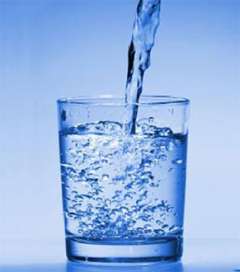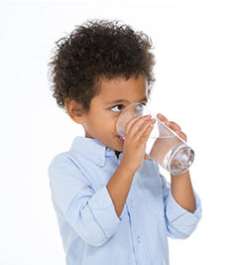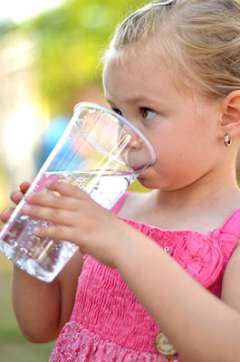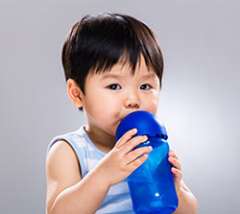When to Stop Eating and Drinking

You may be wondering if you can drink water before anesthesia or before surgery. Or when you must stop eating. The answer depends on your age. Rules about when to stop eating and drinking are created to keep patients safe! It is very important for every patient to have an empty stomach before any surgery or procedure that requires anesthesia, for two reasons:
- To prevent nausea
- To keep any food or liquid from getting into the lungs.
Our Recommendations by Age Group
Our recommendations about when to stop eating and drinking are different for each age group. On this page, you will find information about the specific guidelines for:
- Adults and teenagers over 12
- Children 3 to 12 years old
- Babies and toddlers 6 months to 3 years old
- Infants less than 6 months old

Adults and teenagers over 12
For your safety, it is very important to follow instructions about eating or drinking before surgery.
Adults and teenagers over the age of 12 may have solid foods and dairy products until 8 hours before their scheduled arrival time at the hospital or surgery center. Please don’t drink any alcoholic beverages within 8 hours of your scheduled arrival time.
You are encouraged to drink clear liquids before surgery or anesthesia — NOT milk or dairy products — until 2 hours before the time you are scheduled to arrive at the hospital or surgery center. Staying hydrated is good for you, and it’s especially important in hot weather!

Clear, see-through liquids include:
- Water
- Clear fruit juices such as apple juice and white cranberry juice
- Plain tea or black coffee (NO milk or creamer)
- Clear, electrolyte-replenishing drinks such as Pedialyte, Gatorade, or Powerade (NOT yogurt or pulp-containing "smoothies")
- Ensure Clear or Boost Breeze (NOT the milkshake varieties)
Certain procedures may require special preoperative fasting instructions. If you receive separate instructions from your surgeon or the physician performing your procedure, please follow those carefully. For example, patients undergoing colonoscopy, bariatric (obesity) surgery, or colorectal surgery may be instructed to be on a clear liquid diet before surgery for a day or more prior to their procedure. Please contact your surgeon’s office with specific questions.
Here is a table to explain the timing of when to stop eating and drinking. Look for your scheduled arrival time, and when to stop eating solid food. Please continue to drink clear liquids as you wish until 2 hours before your arrival time.
| Stop Solid Foods | Drink Clear Liquids Until | Arrival Time |
|---|---|---|
| 10 p.m. | 4 a.m. | 6 a.m. |
| Midnight | 6 a.m. | 8 a.m. |
| 2 a.m. | 8 a.m. | 10 a.m. |
| 4 a.m. | 10 a.m. | 12 p.m. |
| 6 a.m. | 12 p.m. | 2 p.m. |
Children 3 to 12 years old

For your child's safety, it is very important to follow instructions about eating or drinking before surgery.
Children between the ages of 3 and 12 may eat solid foods and drink milk or other dairy products until 8 hours before the scheduled time of their surgery or procedure.
Encourage your child to drink clear liquids before surgery — NOT milk or dairy products — until 2 hours before the time of the procedure. Staying hydrated is good for your child, and it’s especially important in hot weather!
Clear, see-through liquids include:
- Water
- Clear fruit juices such as apple juice and white cranberry juice
- Clear, electrolyte-replenishing drinks such as Pedialyte, Gatorade, or Powerade (NOT yogurt or pulp-containing "smoothies")

Certain procedures may require special preoperative fasting instructions. If you receive separate instructions from your child's surgeon or the physician performing the procedure, please follow those carefully. For example, patients undergoing colonoscopy or colorectal surgery may be instructed to be on a clear liquid diet the day before surgery. Please contact your surgeon's office with specific questions.
Here is a table to explain the timing of when your child should stop eating and drinking. Look for your child’s scheduled procedure time, and when to stop giving solid food. Please encourage your child to drink clear liquids before surgery as desired until 2 hours before the procedure.
| Stop Solid Foods | Drink Clear Liquids Until | Surgery Time |
|---|---|---|
| 11 p.m. | 5 a.m. | 7 a.m. |
| Midnight | 6 a.m. | 8 a.m. |
| 2 a.m. | 8 a.m. | 10 a.m. |
| 4 a.m. | 10 a.m. | 12 p.m. |
| 6 a.m. | 12 p.m. | 2 p.m. |
Babies and toddlers 6 months to 3 years old

For your child's safety, it is very important to follow instructions about eating or drinking before surgery.
Babies and toddlers between the ages of 6 months and 3 years may eat solid foods until 8 hours before the scheduled time of their surgery or procedure.
Your child may drink milk, formula, or breast milk until 6 hours before the scheduled time of the surgery or procedure.
Encourage your child to drink clear liquids — NOT milk or dairy products — until 2 hours before the time of the surgery or procedure. Staying hydrated is good for your child, and it's especially important in hot weather!
Clear, see-through liquids that are good for your child include:
- Water
- Apple juice
- Pedialyte

Certain procedures may require special preoperative fasting instructions. If you receive separate instructions from your child's surgeon or the physician performing the procedure, please follow those carefully.
Here is a table to explain the timing of when your baby or toddler should stop eating and drinking. Look for your child’s scheduled procedure time, and when to stop giving solid food and dairy products. Please offer your child clear liquids before surgery as desired until 2 hours before the procedure.
| Stop Solid Foods | Stop Milk | Drink Clear Liquids Until | Surgery Time |
|---|---|---|---|
| 11 p.m. | 1 a.m. | 5 a.m. | 7 a.m. |
| Midnight | 2 a.m. | 6 a.m. | 8 a.m. |
| 2 a.m. | 4 a.m. | 8 a.m. | 10 a.m. |
| 4 a.m. | 6 a.m. | 10 a.m. | 12 p.m. |
| 6 a.m. | 8 a.m. | 12 p.m. | 2 p.m. |
Infants less than 6 months old

For your baby's safety, it is very important to follow instructions about feeding before surgery.
You may offer your baby formula or breast milk until 4 hours before the scheduled time of the surgery or procedure.
Encourage your baby to drink clear liquids — NOT milk or dairy products — until 2 hours before the time of the surgery or procedure. Staying hydrated is good for your baby, and it's especially important in hot weather!
Clear, see-through liquids that you can offer to your baby include:
- Water
- Apple juice
- Pedialyte
Certain procedures may require special preoperative fasting instructions. If you receive separate instructions from your baby's surgeon or the physician performing the procedure, please follow those carefully.
Here is a table to explain the timing of when your baby should stop feeding. Look for your baby's scheduled procedure time, and when to stop giving formula or breast milk. Please offer your baby clear liquids as desired until 2 hours before surgery.
| Stop Formula or Breast Milk | Offer Clear Liquids Until | Surgery Time |
|---|---|---|
| 3 a.m. | 5 a.m. | 7 a.m. |
| 4 a.m. | 6 a.m. | 8 a.m. |
| 6 a.m. | 8 a.m. | 10 a.m. |
| 8 a.m. | 10 a.m. | 12 p.m. |
| 10 a.m. | 12 p.m. | 2 p.m. |